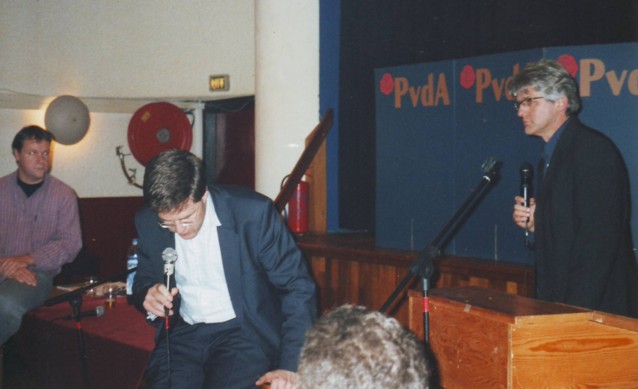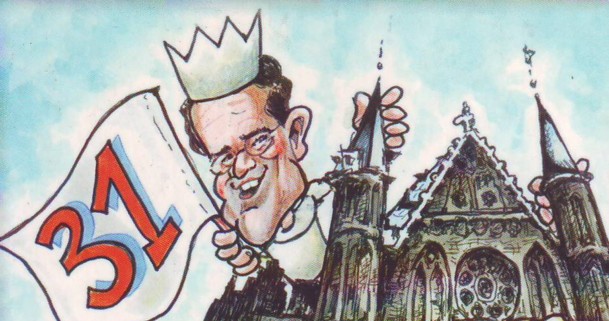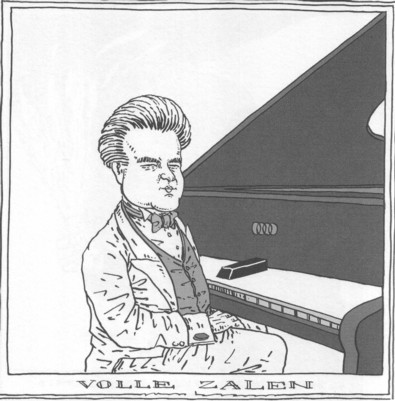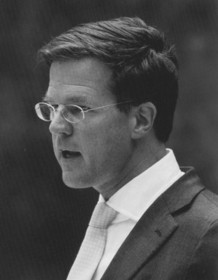
Figure 1: Debate between Mark Rutte and Harrie Bosch
(alderman in Utrecht) in 2004. Discussion leader
Hans Spekman, at the time member of parliament
Mark Rutte leaves behind a lasting impression on policy development in the Netherlands. He has contributed to the institutional change of the past 20 years. Apparently, an individual can sometimes significantly influence the events as an actor. The present blog wants to understand what makes Rutte so special, and therefore analyzes some of his strengths and weaknesses. This actions are placed within the ideological context of his party and of society. The consulted sources reveal what liberalism, morals and leadership mean for Rutte.
My blogs deal with policy development. I am quite fond of actor-centred institutionalism (ACI). The actors defend their interests in the action arena. Their options for action are bounded by the institutions. Thanks to the ACI method, the results of policies can be described and explained. Although it is rarely possible to predict the results of policies, institutionalism does indicate what can reasonably be expected. The problem is evidently, that information is incomplete, so that the analysis becomes unrealistic. For instance, the analysis can not take into account personal peculiarities of actors. Therefore my blogs only marginally address biographies of policians1.
Now I will make an exception for Mark Rutte. Since 2002 he is one of the leading persons in Dutch politics. He was prime minister from 2010 until 2024, and the most successful Dutch politician since the Second Worldwar. A previous blog shows that under his leadership the VVD became the largest party in the Netherlands. This is an admirable result in the present political arena, which did end the dominant position of the social-democracy (PvdA) and christian democracy. They must accept liberalism (VVD, D66) and national conservatism (LPF, PVV) as equal competitors. Mark Rutte uses a structured approach, which makes him interesting for the policy researcher. In this blog I will try to reveal aspects of his structure.
While writing this blog I notably consulted four sources: In gesprek met Rutte (in short IM), Mark (M), Mark Rutte (MR) and Het raadsel Rutte (RR). I also consulted again Het minderheidskabinet (MK) and Vrienden tegen wil en dank (WD)2.
Originally Rutte was not a convinced liberal (p.19 in M). He joined the liberal youth organization JOVD (Youth Organization Freedom and Democracy), because he liked the people (M p.18). At the time the JOVD was nationally the largest youth organization, with 5000 members. During his study Rutte was chairman of the JOVD for three years, from 1988 until 1991. The JOVD did not excel in substance3. The members were mainly engaged in an internal power struggle (M21, MR37, MR188). Here Rutte could survive thanks to his accommodating personality. Under his leadership cooperation was initiated with the Young Democrats, and together with the Young Socialists attempts were made to conclude a Purple agreement (M2-27). Purple was seen as an alternative for christian neocorporatism.
The JOVD culture is also typical for the VVD. This party mainly strives for electoral successes (M30). Individuals are more important than ideological goals (M34, 66). Liberals do not have a clear opinion about national identity (M35). This is awkward in the pluralistic society, where the state must sometimes take a stand in identity politics (M9, 34)4. Rutte got to know the VVD culture during the period 1993-1997, while he was a member of the board of the national party. The VVD is eminently a party of managers. During the past half of a century it has been part of government coalitions for 80% of the time. Risky coalitions, for instance with the LPF or the PVV (as a supporting party) were not avoided. This demonstrates a strong belief in democracy, and especially much confidence in one's own cleverness.
Since his period in the JOVD Mark Rutte had acquired the image of social liberalism. An additional factor was his position as secretary of state in the department of social security and employment (in short ZSW) (MR18). This image is misleading. Actually, as chairman of the JOVD he simply expressed the progressive opinions of others in the JOVD (M35). His approach is characterized by adaptation (M22, MR19). Already at SZW Rutte was convinced that people are made dependent by social benefits (MR68). Therefore he believes (in line with classical liberalism) that austerity in this branch is justified. He is afraid that people will see the state as a happiness machine (IM30, 45).

In 2004 Rutte in his position as secretary of state in the cabinet Balkenende 2 called the VVD a worn-down brand (M53). Then he advocated a broader political agenda, which also addresses education, migration and personal freedom (MR49, 67). In 2006 Rutte was elected party leader of the VVD. This evidently forced him to express the party position. Thus in 2007 he opposed the cultural relativism of the multicultural movement (M88). Rutte wrote a declaration of principles, and avowed the jewish-christian tradition and humanism (M90). Also in 2007 he tried to promote the word Greenright (M92). His message was that innovation would automatically solve all environmental problems. Environmental subsidies should be abolished (MR70). Also in this respect his liberal profile becomes apparent.
In 2008 Rutte propagated the theme of freedom of speech (M95). Previously, Fortuyn had used this in order to attract voters. Together with Wilders, Rutte proposed to eliminate the restrictions of speech. He gave up this idea, when it turned out that it alienated the parties in the political centre. Rutte probably tried with these attempts to reposition the VVD as a brand. After 2010 this was no longer necessary, and since then he was satisfied with the old VVD (MK197). It is striking that in 2020 some youth in the VVD called their party worn-down (MR128).
Already the campaign of 2010 focused on austerity, migration and safety as ideological priorities (M102, MR127, RR99, MK179). Here the VVD saw the hardworking Dutchman as its target and supporter (M111, IM188). The government apparatus was seen as a burden on growth (IM216). Migration of disadvantaged persons is undesirable, because they strain the social security, and thus increase the state expenditures (IM46). Rutte rejects farreaching plans, because they force society into a mould (MR107). Nevertheless, he is a convinced liberal5.
Originally Rutte wanted to restrict the influence of the European Union. In 2012 he refused to continue financial support for the poor Greece. But also here Rutte changed his view. He has always promoted lower Dutch contributions to the European Union (MR109). In 2016 he helped to realize the deal with Turkey about migration to Europe. He became aware that cooperation pays (MR104, RR139). He was also shocked by Brexit (MR106). Henceforth he called the European Union a community of values (MR108). Thus his authority in Europe increased (RR143). In 2020 Rutte again insisted on administrative reforms in the South European countries (MR122).
Finally, in 2024 Rutte applied for the position of secretary general of Nato. Indeed safety has always been a cornerstone of his ideology. But here the picture is mixed. During his cabinets less has been invested in Dutch defense than during the cabinets Balkenende.
Perhaps most striking of Mark Rutte is the loyalty to his family and childhood friends (M171). Every week he dined with his mother. Later, when she moved to a nursing home, he visited her each week (MR10)6. He spends his holidays together with childhood friends (M170). This routine provides the structure, which allows him to survive in the political hustle and bustle (RR24,27,34). He is flexible in his views, and abandons them when they fail to resonate (M141). It irritates him when agreements are not honored (M141, IM200). Sometimes during internal meetings he can have a tantrum (MR115, RR24, 175). In such cases he apologizes afterwards. The mutual trust must be maintained7. In external appearances he sometimes uses street language ("Buzz off", MR180, RR128; "I would love to beat them all up", MR183). Apparently this is his manner to express emotions.
Rutte lives according to the principle, that you must remain unconditionally true to your own convictions (MR209). His life experiences have reinforced his personality. Therefore he does not take failures personally, but relates them to his position or environment (RR31). Obviously you do need to adapt to your environment. Rutte is indeed skilled in relativizing contents. When in 2013 Black Pete was criticized as a symbol, originally he defended this traditional figure (MR176). In 2019 he began to dislike the disrupting effect of Black Pete. He internalized the criticism, as it were (RR89).

Thanks to his adaptations he rarely suffers from sleeping problems (MR190). By nature he is cheerful, jovial and relaxed. He derives optimism and positivism from his liberal conviction. He knows that this makes a pleasant impression (RR123). Rutte invests in relations, but this is partially functional (RR36, WD150). Thanks to mutual interest you increase the understanding of each others needs. He must spread his attention widely. He enjoys his position, but realizes that it is shaky (RR147, WD96)8. For Rutte, bluff is a way to survive in political debates (M108)9. Others interpret his bluff as outright lies10.
Mark Rutte is sympathetic and gay in his daily dealings. He succeeds in building trust with the people in his vicinity11. He needed this as a chairman of the JOVD, and subsequently as a member of the board of the VVD. But the binding leadership of Rutte became truly visible in the role of prime minister in his cabinets. Again and again majorities in the First Chamber were absent, so that there an informal coalition of friendly parties had to be formed and maintained (M139). Within the cabinet he focuses on the process and relations management (M143, RR53, 75). He wants to be a coaching leader, and tries to maintain a sound atmosphere (IM200, WD76).
He gives each of his ministers much room for content (MR187, IM200), He grants successes to his political partners (RR97). This adaptation is a leadership style and a way to survive (M19). He tries to stay away from conflicts between ministers (WD77). Conversely, he demands loyalty and reliability (RR72, 115). Here his morals and style of leadership coincide. Rutte wants to retain the power of government, just like the VVD (RR19). This also means, that a minister in a political crisis can not rely on his backup (RR19). For instance, Opstelten, who always supported Rutte, had to resign as a minister in 2015 (RR157).
Rutte makes long working days, typically 12 to 14 hours (MR152)12. Although his file knowledge is often praised, he never studied files at home (MR22). Working at night makes you less alert during daytime (WD92). He prepared public performances in advance with his staff (MR22). His enormous network is large but instrumental. He often scans the political support in his environment by telephone (RR52, 151). He invests in relations and liaisons in order to maintain the position of power of the VVD (RR100). During impasses he often waits to see if the problem will disappear by itself (RR159). Concessions on content are possible as long as they remain within his liberal red lines (RR195). In situations of crisis, such as the MH17 disaster and the Corona pandemic, Rutte formed a team, and he trusts their advices (RR108). Then, in this team he coordinated the processes13.
Of old, the Netherlands has welcomed immigrants. However, during the past decade the Netherlands has become really popular among immigrants. This makes the national culture more pluralistic. New groups within society demand recognition of their own identity. The state reacts with an accommodating policy, which can result in identity politics (M9, 34). When Mark Rutte in 2002 became secretary of state in the cabinet Balkenende 1, he was immediately confronted with this problem. For, the LPF was a prominent member in this coaliton. Rutte was secretary of state at the ministry of SZW (social security), and had to prepare the introduction of the WWB (the successor of the law of social benefits). The WWB decentralized the policy development of the social benefits. At the same time the budget was cut back, because the cabinet hoped that its execution would be more efficient.
The cabinet Balkenende 1 soon fell, and in Balkenende 2 the LPF was replaced by D66. Rutte could continue his mission. Rutte believes that it is not social to just give someone social benefits (M45). Everybody who can work, must do this. His slogan is: "Don't write off, enrol" (M46). Finally the WWB proposal even obtained support from senators of the PvdA and Groen Links (M45, 47)14. This made Rutte very satisfied (M47). His efforts to bind parties had succeeded. After 2004 he became secretary of state at the ministry of OCW (education). Here he remained active until 2006, in the end in the cabinet Balkenende 3 (without D66). After 2006 Rutte was leader of the VVD, and opposed the cabinet Balkenende 4 of CDA-PvdA-CU.
In the election of 2010 the VVD rather unexpectedly became the largest party. See table 1. The VVD had an ideological aversion agains a possible Purple+ cabinet of VVD-D66-PvdA-Groen Links (IM162, 166, MK68). And the PvdA rejected austerity15. Finally, a VVD-CDA cabinet was formed with support by the PVV. Rutte 1 had a national-conservative ideology. In this cabinet the VVD promoted austerity (M117). These mainly targeted the AOW (pensions), but also affected public broadcasting and development aid (M122). At the time parliament had already become fragmented, so that in the First Chamber the cabinet had to construct varying majorities. The influence of advising councils decreased, perhaps because the cabinet did not like neocorporatism (M141).
In the end the cabinet fell in 2012, when it wanted to economize more than the supporting partner PVV was willing to accept. This illustrates, that Rutte indeed draws a red line with regard to austerity. The cabinet could still economize, thanks to the spring agreement with D66, Christenunie and Groen Links (led by Jolande Sap).
| cabinet | coalition parties | CDA | PvdA | VVD | D66 | PVV | CU | |
|---|---|---|---|---|---|---|---|---|
| 2010-2012 | Rutte 1 | CDA-VVD | 14 | 20 | 21 | 7 | 15 | 3 |
| 2012-2017 | Rutte 2 | PvdA-VVD | 9 | 25 | 27 | 8 | 10 | 3 |
| 2017-2021 | Rutte 3 | CDA-VVD-D66-CU | 12 | 6 | 21 | 12 | 13 | 3 |
| 2021-2024 | Rutte 4 | CDA-VVD-D66-CU | 10 | 6 | 22 | 15 | 11 | 3 |

Table 1 shows, that the election of 2012 was a huge electoral success for the VVD16. Rutte obtained the prime minister's bonus and had become popular. Also, there was a race with the leftwing parties, first the socialist SP, and next the PvdA. Rutte had built up a good relation with Samsom, so that the formation of the cabinet Rutte 2 could be completed quickly (M164 and further, RR62, WD8, 73). This had the disadvantage, that the acceptance in the electorat lagged behind (WD152)17. In the First Chamber Rutte 2 was supported by D66, the Christenunie and the SGP. In fact they ware supporting parties (WD137). The personal relations in the cabinet were very good (WD62 and further). Rutte used this atmosphere in order to cover the ideological conflicts. Decisions were depoliticized (WD178).
The cabinet wanted to rapidly reduce the budget deficit and the state debt. The PvdA no longer objected to austerity, contrary to 2010. Actually these cutbacks were atypical for the PvdA (MR122, RR62)18. The introduction of the Participation Law was simply a continuation of the rightwing policy of Rutte 1. The deduction for the mortgage interest did get lowered. In the polls the PvdA rapidly lost the support of the voters (MR132). The dissatisfaction about Rutte 2 led to good poll results for the PVV.
In 2013 a minor success for the PvdA was the conclusion of a social agreement with the social partners. The VVD dislikes such neocorporatism. Drastic was the abolishment of the social workplaces. In 2015 the VVD and PvdA had to find a difficult compromise about the housing of undocumented (illegal) assylum seekers. This housing conflicts with the image of man of the VVD, and crossed a red line (RR197). Here the opinion of the VVD was closer to the PVV, also for electoral reasons. Then Rutte and Samsom constructed a compromise, because they wanted to save the cabinet (MR144). The policy of Rutte 2 has a slightly egalizing effect on the income distribution (MR148). This was a demand of the PvdA, in exchange for the austerity (WD22).
In the election of 2017 the PvdA was almost eliminated. See table 1. The VVD had a relatively satisfying election result. Rutte enjoyed the prime minister's bonus (MR186). A coalition of four parties was necessary in order to get the majority. VVD, CDA and D66 formed the core. The Christenunie completed the coalition, after the refusal of Groen Links19. In 2019 Rutte 3 also lost the majority in the First Chamber. The environmental and energy policies became the highest priority for Rutte 3, perhaps mainly due to D66. In 2019 after the verdict of the State Council (Raad van State), a crisis arose due to the emission of nitrogen (MR217). In fact since 2015 attempts to find a widely supported solution for this problem had failed. Here innovation (Greenright) did not work.
Moreover, Rutte 3 was confronted with failing policies. In 2021 the cabinet even fell due to the affair with the allowances for childcare. The cabinets Rutte 2 an 3 also had poor policies with regard to the earthquakes due to the gas extraction in Groningen. Here the reproaches mainly targeted the VVD and prime minister Rutte, because they had managed the essential departments for this policy. In 2020 the Netherlands was also affected by the corona virus. The cabinet preferred a rigourous control, just like other states in the west. This policy was widely supported, although there was also fierce opposition. In 2018 Rutte became personally damaged, when the Second Chamber got convinced that he had deliberately withheld information about dividend taxes. Almost the complete opposition supported a motion of disapproval against Rutte (MR206, RR182).

Despite all crises, the coalition of Rutte 3 had good results in the election of 2021. This is maily due to the sense of cohesion, which formed during the pandemic of the Corona virus (RR166). Despite the crises in Rutte 3 the continuation of the coalition was self-evident. Unfortunately, Rutte himself created an incident immediately at the start of the formation, which severely damaged the relations. In an unfortunate way it was revealed, that during the exploring deliberations he had reflected on the position of the prominent CDA member of parliament Omtzigt (RR183). He made the situation worse by initially denying his remark20. His reputation was severely damaged, and the Second Chamber even adopted a motion of disapproval (RR189). Actually the Christenunie no longer wanted to collaborate with Rutte (RR190). Yet the cabinet Rutte 4 did get formed, albeit only after 10 months21.
Also Rutte 4 did not succeed in solving the nitrogen problem. This worsens the crisis, which develops on the housing market. Already after one and a half year the cabinet fell due to an actually unimportant part of the immigration policy. Rutte stuck to his red line in the migration deliberations (RR203). He no longer believed in his cabinet (RR154, 208). After the fall of the cabinet Rutte also had to give up the leadership of the VVD (RR217)22. Thanks to this unfortunate cabinet he did regain some of his old authority.
Recently Mark Rutte has been appointed as secretary general of Nato, starting in october 2024. Everybody is pleased with this appointment, and is conviced that he is qualified. Even this final step in an impressive career displays something of his vage use of speech. For, during all those years he has assured us, that after his leave he will not write a book, or publish texts, or comment on actual politics, or strive for a nice international administrative function (M182). Now this is demonstrably not true. The authors of Het raadsel Rutte suppose on p.248 (not very friendly) that Rutte let his fourth cabinet fall precisely because of this attractive prospect.
I notice that I learn a lot by reading biographies of politicians. Den Uyl impresses me as a skilled ideologist. Lubbers, Kok and Rutte are skilled process managers, who have led successful cabinets. I admire Mark Rutte because of his empathetic, energetic and cheerful style of leadership. But his political message is classic liberalism, and I find this not very social (although he views this differently). Policy development was based too much on the Anglosaxon model, which is difficult to reconcile with the Dutch institutions of neocorporatism. Rutte 2 was not a continuation of Purple. This became painfully clear in the affair of allowances. I recognize a statement by Lodewijk Asscher (the unfortunate minister of SZW in Rutte 2): "I believe that he with all his unique talents and skills could have done better things" (RR223).